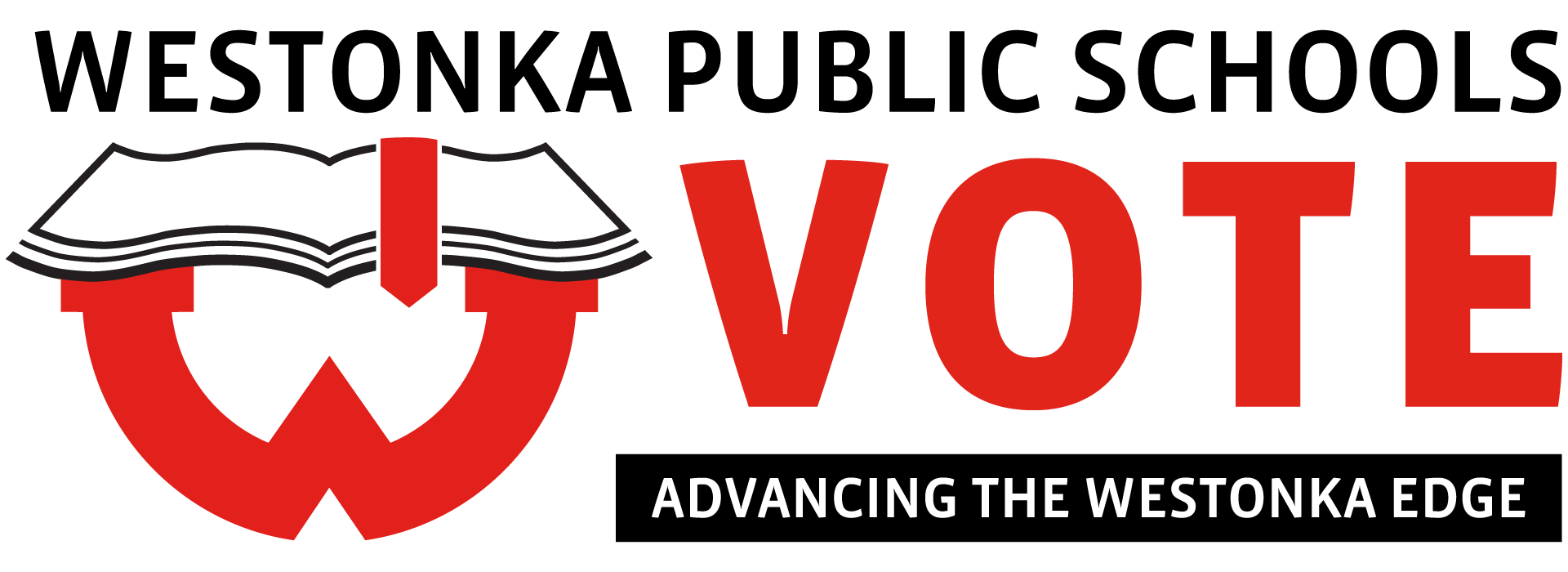Questions & Answers
-

Browse questions and answers about the district's capital projects levy renewal and facilities bond referendum. To view the answers, click on the icon above each question.
Have a question that's not answered here? Contact Supt. Kevin Borg at borgk@westonka.k12.mn.us; 952-491-8001.
-
Would it be cheaper just to build a new high school?
No. A new high school typically costs over $100 million. Redesigning MWHS will gain a result reasonably comparable to a new school but at half the cost.
-
Why not postpone some or all of these projects?
The improvements (safety and security, deferred maintenance, and redesign of MWHS) are a significant and timely investment in our community’s facilities. Postponing the improvements will only cost more later.
-
What other voter-approved levies and bonds are in place?
- Operating levy (supports daily expenses of operating schools): approved in 2019, expires in 2029. This is a phased-in levy; the second and final phase will start affecting taxes payable in 2024.
- Capital Projects levy (supports technology and curriculum): approved in 2014, expires in 2024. The 2023 election will ask voters to extend this existing levy at its current level.
- Facilities bond to build the Westonka Activity Center and the Performing Arts Center: approved in 2016, payable over 15 years.
-
Which vocational programs will be added at MWHS?
If Question 2 (bond referendum) passes, Westonka plans to expand vocational options at Mound Westonka High School to include machining and nursing/emergency response programs, and a carpentry extension to our current woods program. Increasing vocational options will provide more career opportunities for students and a trained workforce for local businesses.
These specific programs were selected for the following reasons:
- Machining: The addition of a machining program at MWHS will provide vocational opportunities for students in the in-demand field of machine tool technology. In a district the size of Westonka, it’s important to have learning spaces that can support multiple programs. The machining classroom will also support and advance the high school’s growing robotics program and will allow MWHS engineering students to apply learning in a deeper way.
- Nursing/Emergency Response: Adding nursing and emergency response courses will expose students to careers that meet the basic needs of our communities, including the health and safety of individuals and families. Students who successfully complete the high school courses will be eligible to sit for a variety of certification exams and begin working in a wide range of fields. Possible certifications include: certified nursing assistant (CNA), emergency medical technician (EMT), emergency response team (ERT) and fire-rescue technician. The new classroom space will also be utilized by the community outside the school day for education and training (e.g., CPR certification courses). These medical-related course offerings will provide students a solid introduction to the medical field and preparation for different medical-related careers.
- Carpentry: The popular woods program at MWHS has over 150 students enrolled each year. Adding outdoor construction space will allow the woods program to meet student interest while providing an authentic learning experience to model actual professional construction projects.
- Machining: The addition of a machining program at MWHS will provide vocational opportunities for students in the in-demand field of machine tool technology. In a district the size of Westonka, it’s important to have learning spaces that can support multiple programs. The machining classroom will also support and advance the high school’s growing robotics program and will allow MWHS engineering students to apply learning in a deeper way.
-
Will my school property taxes continue to increase after the first year of the bond?
No. If Question 2 (bond referendum) is approved, residents will experience a one-time increase to their school property taxes and will see a level tax rate over the 25-year payment period of the bond. As presented at the June 5, 2023 Westonka School Board meeting, the proposed $93.4 million plan includes two bond issues that wrap around the district’s existing debt. As the current debt commitments fall off, payments on the bond increase, but total school property taxes for residents will remain flat (pending home valuation changes).
The bond was structured this way for three reasons: 1) to manage the tax implications for property owners, 2) to create consistency for property owners, and 3) to mitigate the interest expense. For more detail, please review the project financing schedule PDF.
-
Why was synthetic turf chosen to address the maintenance needs of Field #12 (interior field of track)?
The natural turf on Field #12 is in very poor condition. If Question 2 (bond referendum) is approved, the district will install a synthetic turf field inside the track that will increase durability, extend the playing season, and allow for extensive use. The addition of a synthetic turf field on the high school campus will also help the district maintain/improve the quality of its existing grass fields, as there will be less pressure from three-season use.
-
What is the impact on taxes if the capital projects levy is renewed?
There is no new tax increase if voters approve Question 1, as it is a straight renewal of an existing capital projects levy that provides a strong technology system and access to up-to-date curriculum. A no-increase renewal means the cost for a $400,000 home under the renewed levy will be the same as a $400,000 home under the current (expiring) levy.
If the levy is renewed, the district’s tax authority will remain the same as originally approved in 2014. See the estimated tax impact of the capital projects levy renewal.
-

When would construction begin on the bond referendum projects?
If Question 2 (bond referendum) is approved, construction is expected to take place between 2024 and 2026, with the majority of work being completed over the summer months.
-

Can school districts refinance their bond debt?
Yes! Similar to a home mortgage, when bond interest rates fall, school districts have the opportunity to refinance their debt, and Westonka Public Schools has a history of doing just that. For example, in the 2020-21 school year, Westonka refinanced a bond approved by voters in 2011 for districtwide facilities maintenance, resulting in an interest savings of $1,021,069 for district taxpayers.
-

How do I vote?
Visit the Voting Information Page for details on:
- in-person early voting,
- voting by mail, and
- Election Day voting.

